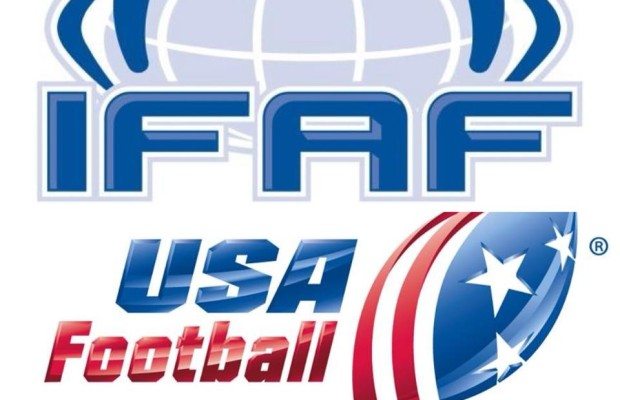2015 IFAF WCs Schedule Released; New Format Raises Questions

The 2015 IFAF World Championship will see a new format for the competition with the eight competing national teams seeded into two groups.
The four top ranked teams play in Group A while the next four play in Group B.
The tournament will open on July 9th, in Canton, Ohio with a clash between Australia and Korea. This will be followed by France versus Brazil and then Canada versus Japan. The host nation, USA, will close out the day against Mexico.
Due to December’s cancellation and change in venue, a new format had to be decided upon to accommodate the eight (as opposed to original twelve) teams. The notable and surprising new information released last month is how the groups shall be formed and the how the winners shall advance.
IFAF Managing Director Andy Fuller commented on the new format and structure for this summer’s World Championships.
From time to time it is valuable to revisit tournament structures and consider whether change could be beneficial for participants and the event as a whole.
I anticipate that the structure which will be employed this summer with two groupings for teams will retain the integrity of the competition whilst serving to provide some close and thrilling fixtures from the outset.
However, unlike past tournaments, this summer’s new structure leaves open the possibility for nations to meet twice in the first three rounds.
With the release of the schedule last week, we can see how this may shake out.
For example, if all favored seeds win out in their first and second round matches, the third round would find Australia and Korea in a rematch of the opening round game, as same goes for Japan versus Canada.
Fuller addresses this possibility;
The structure does open up the opportunity of some teams playing each other twice over the course of the early stages of the competition. The implications of this were considered detail and it was felt that whilst there may be some initial doubts, these would be outweighed by the positives of the overall structure and that the competitive element would not be diminished for the two teams as the challenge to retain an advantage over an opponent or redress a loss acts as a significant motivator.
It seems that IFAF acknowledges that the changing nature of the American football’s global development is directly tied to the format and structure of global football’s premier event, the IFAF World Championships.
And, according to Fuller, it sounds like that structure is still evolving.
In recognising that we have to assess the impact of changes from a long-term standpoint, post tournament our Competitions Committee will review the tournament to inform thinking for future championships.
Opening Day Schedule
Thursday, July 9 (all times EDT)
11:00 am – #6 Australia v. #7 Korea (B2) 2
2:00 pm – #5 France v. #8 Brazil (B1)
5:00 pm – #2 Canada v. #3 Japan (A2)
8:00 pm – #1 USA v. #4 Mexico (A1)
Sunday, July 12
11:00am – Loser B2 – Loser B1 (B3)
2:00pm – Winner B1 – Winner B2 (B4)
5.00pm – Loser A2 – Loser A1 (A3)
8.00pm – Winner A1 – Winner A2 (A4)
Wednesday, July 15
11:00am – Loser A3 – Loser B3 (B5)
2:00pm – Loser B4 – Winner B3 (B6)
5:00pm – Winner A4 – Winner B4 (A5)
8:00pm – Loser A4 – Winner A3 (A6)
Championship Saturday, July 18
11:00am – 7th-8th place (Loser B6 – Loser B5)
2:00pm – 5th-6th place game (Winner B5 – Winner B6)
5:00pm – Bronze Medal Game (Loser A6 – Loser A5)
8:00pm – Gold Medal Game (Winner A5 – Winner A6)
Closing ceremony after conclusion of Gold Medal game